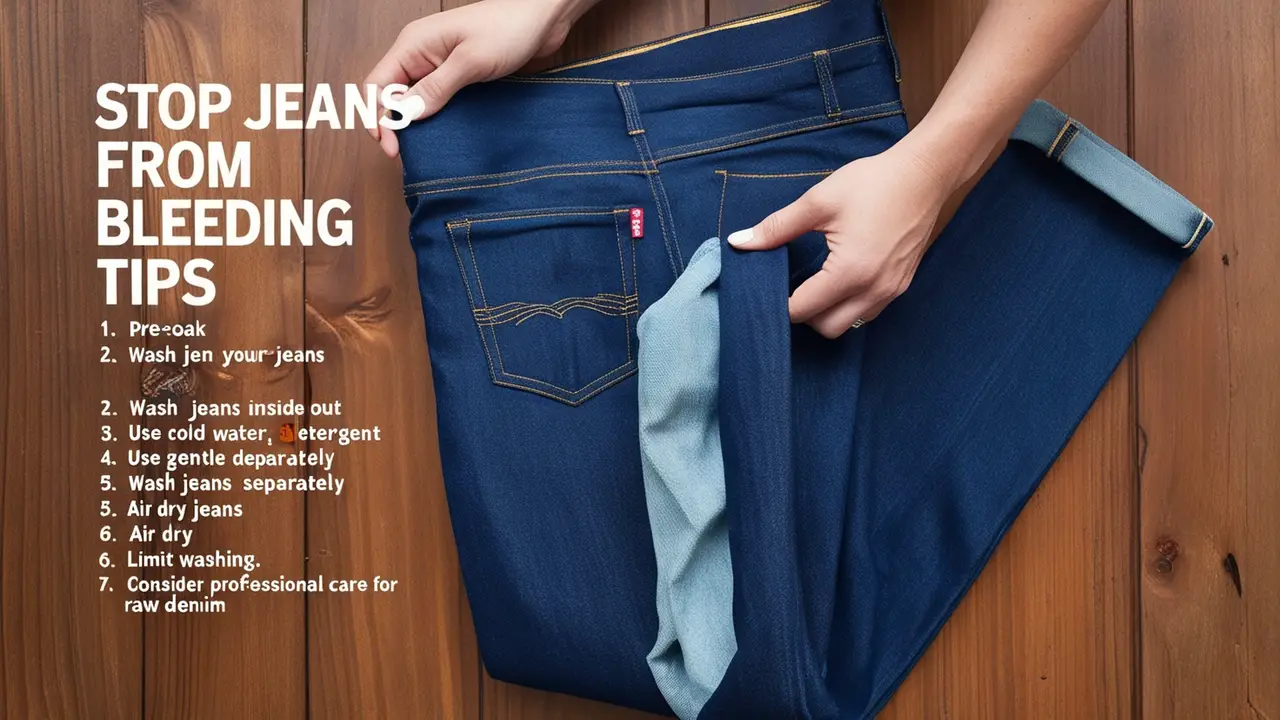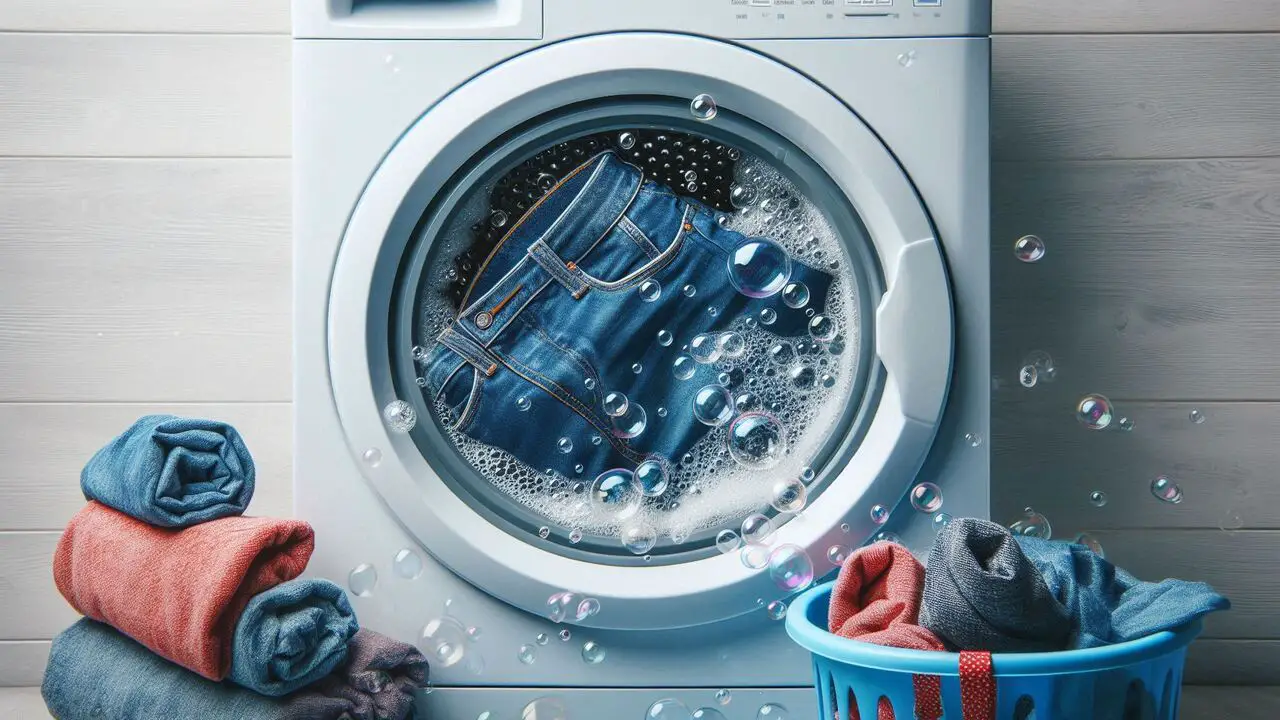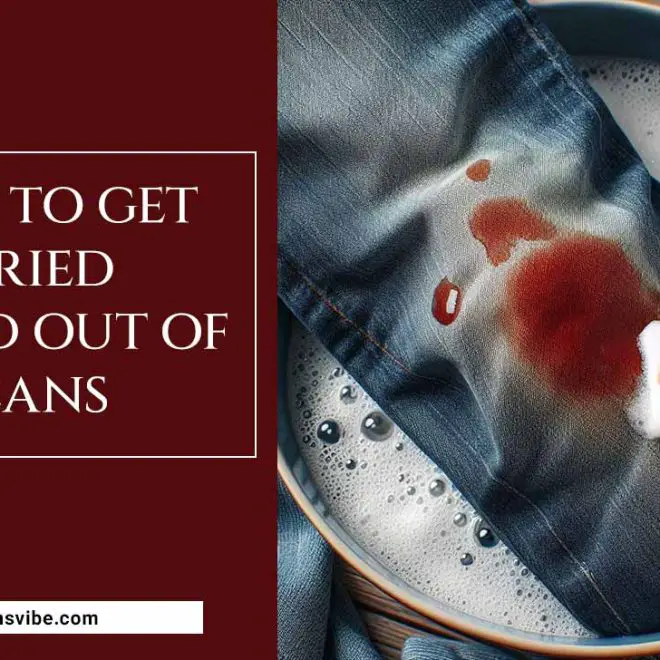Jeans, especially dark denim and raw denim, are known for bleeding color, often causing stains on clothes, shoes, or furniture.
This happens when excess dye, particularly indigo dye, isn’t fully set, leading to color bleed during wear or in the wash. If you’re tired of your favorite jeans ruining your laundry, follow these easy steps to stop jeans from bleeding and preserve their color.

Stop Jeans From Bleeding With These Handy Tips

To stop jeans from bleeding, start by soaking them in cold water mixed with a cup of vinegar to help set the dye. Always turn the jeans inside out before washing, use cold water with a gentle detergent designed for dark clothes, and wash them separately from lighter garments.
Air dry the jeans to preserve their color, and limit washing to avoid loosening excess dye. For raw denim, consider specialized care like dry cleaning.
- Wash jeans separately from others
- Use cold water for washing
- Add vinegar to the wash
- Use a color catcher sheet
- Turn jeans inside out
- Avoid fabric softeners completely
- Limit exposure to sunlight
- Dry jeans in the shade
- Store jeans away from heat
- Wash less frequently when possible
1. Pre-Soak Your Jeans
Before wearing your new jeans, soak them in a dye bath of cold water and white vinegar. Fill a sink or bucket with cold water and add 1 cup of white vinegar. Turn the jeans inside out and soak them for 1 hour to overnight. The vinegar acts as a dye fixative, helping lock in excess dye and prevent future color bleeding.
2. Wash Jeans Inside Out

Always turn your jeans inside out before washing them. This reduces friction between the denim’s surface and other clothes, helping prevent dye bleeding. Washing them inside out also minimizes fading on the outer fabric.
3. Use Cold Water And Gentle Detergent
When washing jeans, always use cold water. Hot water can cause the fabric fibers to expand, loosening the dyes and making dye bleeding worse. Pair this with a mild laundry detergent designed for dark clothes, like Woolite Dark or Tide Plus ColorGuard, which helps preserve color.
4. Wash Jeans Separately
To avoid staining other clothes, wash your denim jeans separately or with similar dark colors like black or dark blue. This way, any loose dye won’t transfer to lighter clothes. Avoid using harsh detergents that could strip away the color.
5. Air Dry Your Jeans

Instead of tossing your jeans into a hot dryer, air dry them by laying them flat or hanging them up. Heat from dryers can fade colors quickly and cause the fabric fibers to weaken, leading to faster color loss.
6. Limit Washing
Washing jeans frequently can wear down the fabric and cause dye bleeding. Try spot cleaning your jeans or wearing them a few times before washing them. If you’re concerned about hygiene, airing them out or freezing jeans overnight can freshen them up without a wash cycle.
7. Consider Professional Care For Raw Denim

Raw denim is untreated and often contains excess indigo dye that can bleed onto clothes, shoes, and furniture. Unlike pre-washed denim, raw denim develops a unique fade pattern over time, which is why many enthusiasts prefer not to wash them frequently.
However, proper care is essential to avoid excessive bleeding and to maintain the rich color and structure of the fabric. Taking extra precautions can preserve the integrity and appearance of raw denim.
Here are a few tips for caring for raw denim:
- Limit washing: Wear for several months before the first wash to allow natural fading.
- Spot clean only: Address stains by spot cleaning with a damp cloth.
- Cold soak: When washing is necessary, soak in cold water with a mild detergent.
- Air dry: Always air dry raw denim to avoid shrinkage and fading.
- Avoid machine washing: Hand-washing or dry cleaning is often recommended for raw denim.
Conclusion
Stopping your jeans from bleeding is easy with the right care techniques. By pre-soaking your denim, washing it inside out in cold water, using gentle detergents, and air-drying, you can prevent unwanted color bleeding and extend the life of your jeans. Whether it’s raw denim or dark jeans, these tips will keep your wardrobe safe and your jeans looking fresh.
FAQs
1.Why Do Jeans Bleed Color?
Jeans bleed color due to excess dye, especially indigo dye, not being fully set in the fabric. Friction, water, and detergents can loosen the unattached dye, causing color bleed.
2.How Can I Stop Black Jeans From Bleeding?
Soaking black jeans in cold water with a cup of vinegar before washing, using a mild detergent, and washing them inside out can reduce color bleeding.
3.Will Vinegar Prevent Denim From Bleeding?
Yes, vinegar acts as a dye fixative and helps lock in excess dye, making it less likely for your jeans to bleed when worn or washed.
4.Should I Wash Raw Denim Differently?
Yes, raw denim requires special care. Many recommend avoiding frequent washing, using cold water, and occasionally opting for dry cleaning to preserve its color.
5.Can I Wash My Jeans With Other Clothes?
It’s best to wash jeans separately, especially during the first few washes, to avoid dye bleeding onto other clothes.
6.What Laundry Detergent Should I Use To Stop Jeans From Bleeding?
Use a detergent made for dark clothes, like Woolite Dark or Tide Plus ColorGuard, which helps protect the color of your denim.
7.Does Hot Water Cause Jeans To Bleed More?
Yes, hot water can open up fabric fibers, releasing more dye and causing jeans to bleed. Always wash denim in cold water.











